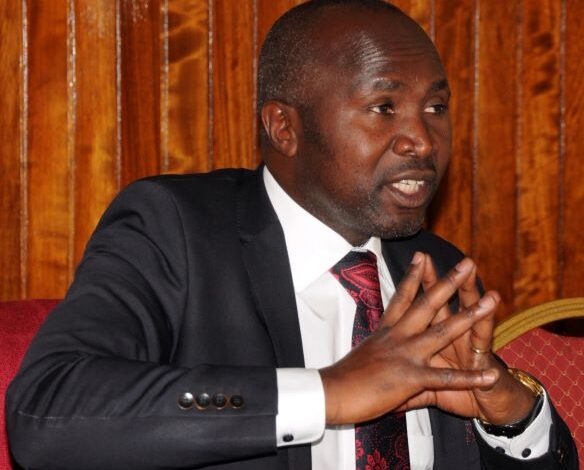“Introduce A New Motion Or Seek Legal Redress,” Speaker Among Advises Creepy Ssekikubo

The Speaker of Parliament Anita Among has advised Hon Ssekikubo, the mover of a censure motion against the former Leader of Opposition Mathias Mpuuga and three commissioners; Esther Afoyocan, Prossy Akampulira, and Solomon Silwany to either “introduce a new motion or seek legal redress.
On August 12th, the High Court in Kampala cleared the commissioners of any wrongdoing in reviewing service awards. Based on this ruling, Speaker Among issued guidance on August 16th 2024, that the censure motion had suffered a stillbirth, citing the “res judicata principle.”
Court Declares Service Award To Mpuuga, 3 Commissioners Lawful
The res judicata principle bars Parliament from re-debating a matter concluded by the Court. However, Ssekikubo was unsatisfied with the Speaker’s guidance, claiming the ruling had “not affected their motion.”
Ssekikubo argued that the motion was far wider than the service award adjudicated by the court. In his August 19th, 2024 letter, he requested the Speaker to expunge issues of service award and allow the motion to be tabled with other grounds.
However, in her response dated August 20th, 2024, the Speaker flatly rejected Ssekikubo’s request, explaining that her examination of the “impugned motion” found it; “heart and/or basic structure” was deeply rooted in the payment of service awards to the backbench commissioners as approved by the Parliamentary Commission.”
She contends, “the line between debating the motion and contravening the constitutional principles highlighted herein is too blurred that any presiding officer would be incapable of controlling the debate to ensure that the matters already decided upon by the court are not introduced in the realm of debate resulting in predictable contempt of court and the obvious affront on the independence of the judiciary and separation powers.”
She explained, “placing the motion on the order paper in its current form perforated with allegations of service award with an invitation to Members of Parliament to debate, consider, and pass a resolution on the same, may directly interfere with the findings and orders of the Court in Bwette’s case.”
She thus vowed never to facilitate “the unconstitutional purpose of having Parliament contravene its mandate under Article 79(3) of the Constitution of protecting and promoting the democratic governance, namely, the doctrine of separation of powers and independence of the judiciary, among others.”
In view of the observations above, Among made gave a free counsel to her member, Ssekikubo.
“Having found as I have above, and in exercise of the authority vested unto me by rule 7 (2) and (3), I must hold that I cannot sever a document which has no legal standing. You may, however, consider introducing a new motion independent of whatever was resolved in Miscellaneous Cause No.85 of 2024 in compliance with the provisions of rule 110s or seek legal redress,”
Ssekikubo had argued that there were matters not subject to litigation, which, could be debated by the House. However, the Speaker noted that the High Court had resolved the legality and procedural impropriety of the Parliamentary Commission’s decisions.
The Speaker explained that severance would require expunging all aspects related to service awards, which would materially alter the original motion.
She said, “if I am proceed to expunge all issues related to decisions taken by the Parliamentary Commission on 6th May 2022, the question that will remain to be answered is whether the section that stands to be expunged from the motion is essential to the efficacy of the motion, whether it is a section without which the motion would be incomplete and unworkable, and whether a section of the motion is without which the legislators would effectively debate the motion.”
She asserted, “this is my duty under rule 7 (2) and (3) of the Rules of Procedure.
She then cited the ruling by Missouri in Hammerschmidt vs. Boome County, 877 S.W.2D 98 (1994) where the Supreme Court held that “Severance is inappropriate if the valid provisions of the statute are so essentially and inseparably connected with, and so dependent on, the void provisions without the void one.”
It added, “Severance is also inappropriate if the court finds that the valid provisions, standing alone, are incomplete and are incapable of being executed in accordance with the legislative intent.”
Permitting severance in such a motion “as you seek,” the Speaker told Ssekikubo, “encourages the legislature to disregard its oath to protect the Constitution of the State and procedural mandates expressed within it. Severance provides no incentive for legislators to follow the clear and express mandates of the Constitution, while processing motions such as yours.”
To justify her argument, she said, “the above reasoning was the basis for decisions such as in Prof Oloka-Onyango and 9 Others vs. Attorney General, Constitutional Petition No. 8 of 2014 where the petitioners alleged that the enactment of the Anti-Homosexuality Act, 2024 by the 9th Parliament was without quorum in the House.”
She added, “and that was in contravention of Articles 2(1) and (2), 88 and 94(1) of the Constitution of the Republic of Uganda and Rule 23 of the Parliamentary Rules of Procedure. Indeed, in the Ssemwogerere vs. AG, Constitutional Appeal No. 1 of 2002, Kanyeihamba JSC aptly said in his lead judgement.”
“…if Parliament is to successfully claim and protect its powers and internal procedures, it must act in accordance with the constitutional provisions which determine its legislative capacity and the manner in which it must perform its functions.”
All eyes are on Ssekikubo, to see what he would do next.
